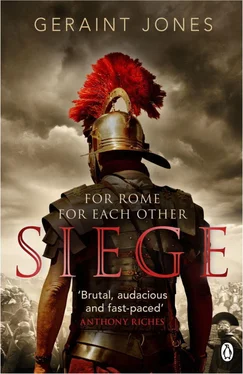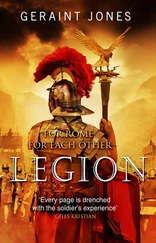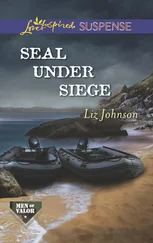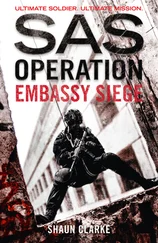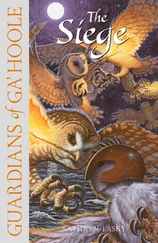Titus shrugged. ‘Turn your back, but you don’t leave my sight until this is over. Afterwards, you’ll never have to see me again.’
H hesitated for a moment. Then he took a wineskin and walked away, sinking on to his heels when he was clear of the blood that had run from Statius’s body. It was as well for his own safety that he stayed. I knew from experience that Titus was not opposed to killing officers, and Brando was one of his wards, now – the Batavian’s kinship to myself and Stumps had seen to that.
The former auxiliary stepped forwards now, and held out his hand to Titus. ‘Pass me the axe.’ Then, blade in hand, he straddled the body of the man that he’d killed. ‘You said Folcher died for nothing,’ he snarled at the corpse. ‘Well, what did you die for, you cunt?’
Titus looked at me. ‘Are you ready to do this?’
‘What choice do we have?’ I asked him.
There was none, of course. To protect the life of one comrade, we would have to butcher the remains of another.
Titus knew that truth. His eyes were as grim as his words.
‘Start cutting.’

Part Three
There are a lot of ways that a soldier can die, and death at the hands of a comrade is not an uncommon one. In fact, when the legions require the most malevolent form of discipline, army commanders can enact the punishment of decimation, where lots are drawn between men of a section and a single man is then condemned to be beaten to death at the hands of the men he called brothers. Funny, how an enlightened civilization keeps its soldiers in check.
Murder was a staple, too. Sometimes pre-meditated, but more often as a result of a drunken brawl or a bull-headed grievance. Fall the wrong way, hit your head in the wrong place, and a man’s lights could go out, never to be relit.
Then there were the accidents. During times of peace – or at least, when not prosecuting campaigns – the army was the Empire’s corps of engineers, and building bridges and aqueducts carried with it the inherent risk of injury. A dropped stone from above or a wobbly piece of scaffold could see a soldier dead or, worse, crippled. Reduced to be a beggar in the streets, living amongst the filth and surviving on scraps.
Of course, soldiers were not immune to the plagues and diseases that were a constant of every civilization. Even senators had to fear the unseen killers, and for the men of the legions, often travelling into new climes, death was more likely to come from a sweated fever than an enemy spear. The discipline of the legions ensured that its men did not live in filth and squalor, but even so, a tightly packed mass of men often seemed too tempting for the gods, or whatever force, to pass by. Entire legions could be reduced without a blade being drawn. Even the baths, a benchmark of Roman enlightenment, were an invitation to death for a man with an open wound.
Boredom could be fatal. Many soldiers were young men, and young men do stupid things. In Pannonia, I recalled watching a soldier who had been challenged by his friends to leap from one rooftop to another. He failed miserably, his life ending as a heap of fractured bone and skull.
Thinking was no good for a soldier’s health, and was to be discouraged. Think too much about your place in the army, and the army’s place in the world, and you might well become a deserter, and deserters died painful deaths. Think about what you had done in the name of glory and perhaps, as I had done, you would consider taking your own life. Then there were men like Statius. He had been stupid enough to give voice to his thoughts, and his dismissal of purpose in Folcher’s death had been enough to bring about his own end.
I thought a lot about that murder during the weeks that followed. The way the saw had ground against Statius’s bones. The way that his blood had soaked the sacks into which we’d shoved his dismembered body. The pant of the hungry dogs that had followed us through the darkest parts of the fort, and the way that they had pulled an arm free from the sacking before we had a chance to run breathlessly clear.
I thought a lot about the murder, and the butchery, but it wasn’t with guilt or shame that I looked back on it – it was with anger. Anger at myself that I should have ever allowed the killing to take place. Anger at myself that I had not dealt with Statius’s cowardice in my own way.
True, I had disliked Statius and his malingering, but he didn’t deserve to die for that spinelessness. I did not want to be like the legions, sentencing to death men who had seen sensible reason to keep their blades sheathed. The punishment was unjust, but once Statius’s heart had stopped beating, his body had become mere flesh, and nothing more. There was no way to turn back time. Brando, my friend and comrade, had then become my only concern. It was for him that I had played a willing part in the gruesome cover-up, and for him that I suffered the shame in the eyes of Centurion H, a man I admired.
After that night, I realized that my mind was becoming as hardened as the chain mail that hung over my shoulders. A war was being fought inside my head, and the darkness had taken the advantage. In a way, it seemed almost a blessing – my nightmares were becoming less frequent. The death of Statius was now an afterthought in my own life, and in that of the fort’s – a murder attributed to the Syrian archers.
The fallout of that revelation had been predictable enough. Fortunately, as it was assumed that Statius had gone looking for revenge for his ‘wound’, Prefect Caedicius had not been proactive in his search for a scapegoat. If anything, he used the Roman’s death as an example of why the men and civilians under his command should remain within the boundaries that he had drawn up. It came as no surprise to find that Statius had been short on friends, and no acts of vengeance were carried out in his name. I was almost coming to believe that the death was free of consequences, when a grim-faced Brando rushed into the alleyways of the civilian encampment.
He found me with Linza. I was scrubbing my mail, and smiling. Smiling until I saw the look on my comrade’s face, and I knew that tragedy had come with him.
‘What?’ was all I asked. Beside me, I felt Linza stiffen.
‘Balbus. The corruption has spread up his arm. The surgeon’s amputating now.’
I dropped my mail and ran with him, Linza left behind in our hurried wake. As my sandals beat the cold dirt, my stomach churned – I knew what this was. This was our punishment. This was justice for our butchery of a comrade.
‘This is because of me,’ Brando breathed, thinking the same.
‘The corruption was there before… that,’ I tried to console the Batavian, and myself.
‘No, Felix.’ Brando was adamant. ‘This is the gods. This is it. The beginning of their punishment. I should have died like a man, Felix. Now… now this…’ His voice trailed off.
We reached the hospital. Balbus’s screams rang out from within.
They were terrible.
‘Wait in the barracks,’ I told my comrade.
He shook his head. ‘I wait here.’
We stood in silence. A breathless Stumps and Micon arrived soon after.
‘Should we go in?’ Stumps asked, wincing at the sound of the screams.
I shook my head. ‘Let the surgeons work.’
‘This is—’ Stumps began quietly.
‘I know,’ I snapped. ‘Enough.’
And so we waited, each one of us stumbling over doubts and accusations and thoughts of divine justice. I had never seen Brando shaken, but now there was a tremor in his hands and jaw.
It seemed like an eternity, but eventually the screams died away. I hoped that Balbus’s life had not gone with them.
Читать дальше
